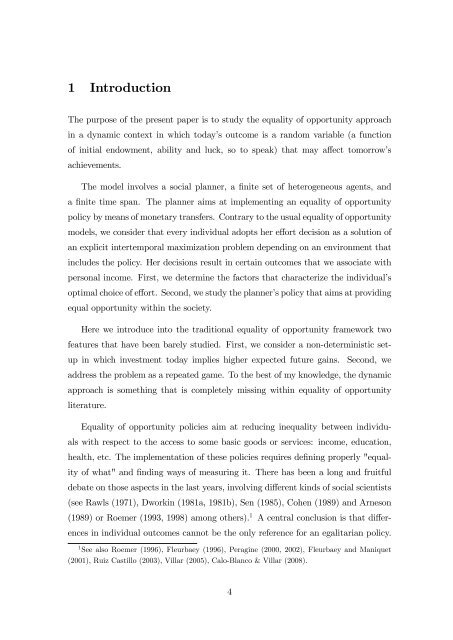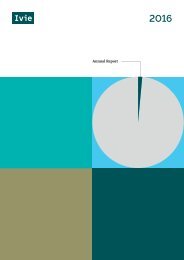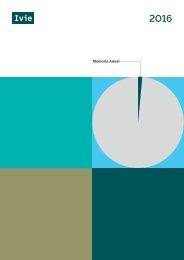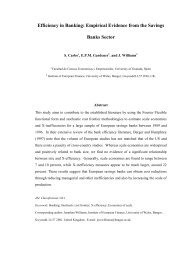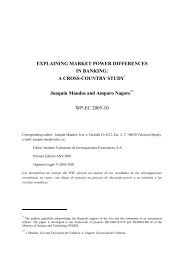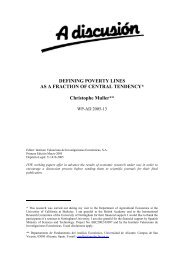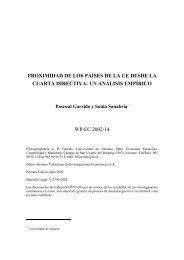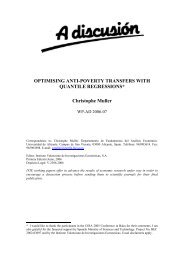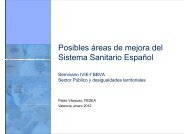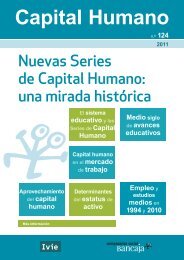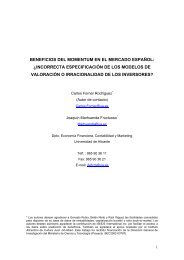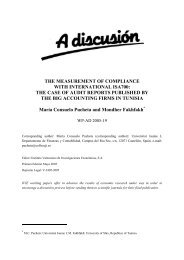You also want an ePaper? Increase the reach of your titles
YUMPU automatically turns print PDFs into web optimized ePapers that Google loves.
1 Introduction<br />
The purpose of the present paper is to study the equality of opportunity approach<br />
in a dynamic context in which today’s outcome is a random variable (a function<br />
of initial endowment, ability and luck, so to speak) that may a¤ect tomorrow’s<br />
achievements.<br />
The model involves a social planner, a …nite set of heterogeneous agents, and<br />
a …nite time span. The planner aims at implementi<strong>ng</strong> an equality of opportunity<br />
policy by means of monetary transfers. Contrary to the usual equality of opportunity<br />
models, we consider that every individual adopts her e¤ort decision as a solution of<br />
an explicit intertemporal maximization problem dependi<strong>ng</strong> on an environment that<br />
includes the policy. Her decisions result in certain outcomes that we associate with<br />
personal income. First, we determine the factors that characterize the individual’s<br />
optimal choice of e¤ort. Second, we study the planner’s policy that aims at providi<strong>ng</strong><br />
equal opportunity within the society.<br />
Here we introduce into the traditional equality of opportunity framework two<br />
features that have been barely studied. First, we consider a non-deterministic setup<br />
in which investment today implies higher expected future gains.<br />
Second, we<br />
address the problem as a repeated game. To the best of my knowledge, the dynamic<br />
approach is somethi<strong>ng</strong> that is completely missi<strong>ng</strong> within equality of opportunity<br />
literature.<br />
Equality of opportunity policies aim at reduci<strong>ng</strong> inequality between individuals<br />
with respect to the access to some basic goods or services: income, education,<br />
health, etc. The implementation of these policies requires de…ni<strong>ng</strong> properly "equality<br />
of what" and …ndi<strong>ng</strong> ways of measuri<strong>ng</strong> it. There has been a lo<strong>ng</strong> and fruitful<br />
debate on those aspects in the last years, involvi<strong>ng</strong> di¤erent kinds of social scientists<br />
(see Rawls (1971), Dworkin (1981a, 1981b), Sen (1985), Cohen (1989) and Arneson<br />
(1989) or Roemer (1993, 1998) amo<strong>ng</strong> others). 1 A central conclusion is that di¤erences<br />
in individual outcomes cannot be the only reference for an egalitarian policy.<br />
1 See also Roemer (1996), Fleurbaey (1996), Peragine (2000, 2002), Fleurbaey and Maniquet<br />
(2001), Ruiz Castillo (2003), Villar (2005), Calo-Blanco & Villar (2008).<br />
4


